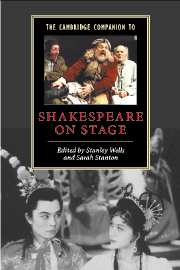Book contents
- Frontmatter
- 1 Shakespeare plays on Renaissance stages
- 2 Improving Shakespeare: from the Restoration to Garrick
- 3 Romantic Shakespeare
- 4 Pictorial Shakespeare
- 5 Reconstructive Shakespeare: reproducing Elizabethan and Jacobean stages
- 6 Twentieth-century performance: the Stratford and London companies
- 7 The tragic actor and Shakespeare
- 8 The comic actor and Shakespeare
- 9 Women and Shakespearean performance
- 10 International Shakespeare
- 11 Touring Shakespeare
- 12 Shakespeare on the political stage in the twentieth century
- 13 Shakespeare in North America
- 14 Shakespeare on the stages of Asia
- 15 Shakespeare and Africa
- Further reading
- Index
10 - International Shakespeare
Published online by Cambridge University Press: 28 May 2006
- Frontmatter
- 1 Shakespeare plays on Renaissance stages
- 2 Improving Shakespeare: from the Restoration to Garrick
- 3 Romantic Shakespeare
- 4 Pictorial Shakespeare
- 5 Reconstructive Shakespeare: reproducing Elizabethan and Jacobean stages
- 6 Twentieth-century performance: the Stratford and London companies
- 7 The tragic actor and Shakespeare
- 8 The comic actor and Shakespeare
- 9 Women and Shakespearean performance
- 10 International Shakespeare
- 11 Touring Shakespeare
- 12 Shakespeare on the political stage in the twentieth century
- 13 Shakespeare in North America
- 14 Shakespeare on the stages of Asia
- 15 Shakespeare and Africa
- Further reading
- Index
Summary
Appropriation anxieties
In 1981 at the Théâtre du Soleil in Paris, Ariane Mnouchkine directed a production of Richard II using her own French translation. Inspired partly by Antonin Artaud's dictum that 'the theatre is oriental', she told an interviewer: 'When we decided to perform Shakespeare, a recourse to Asia became a necessity.' She spoke of trying to find an antidote to the 'psychological venom' which infects western acting; wanting to break from the realistic tradition, she relied on a combination of Shakespeare's text and Asian form. Accordingly, she ignored the play's specifically English, national, resonance, instead importing movement, costumes and a hieratic style borrowed from Japanese Kabuki and Noh, interlaced with Balinese and Kathakali influences plus various styles of Asian music. The result was a blend designed to reveal the play's 'sacred and ritualistic aspects' and the chief means were the disciplined bodies of the actors and the words. Colette Godard describes the effect: the actors face the audience, 'knees flexed . . . hands ceremoniously spread. With their heads held erect, almost never looking at each other . . . they project their lines directly at the audience’. The words ‘come across with incredible clarity . . . It’s as if these weren’t characters, but bodies traversed by a single voice’. But the temperature is not uniformly cool: at the end, Bolingbroke ‘dares [to] kiss the lips of the murdered king, before laying himself out . . . tiny and fragile at the centre of an enormous bare carpet’.
- Type
- Chapter
- Information
- The Cambridge Companion to Shakespeare on Stage , pp. 174 - 193Publisher: Cambridge University PressPrint publication year: 2002
- 3
- Cited by



